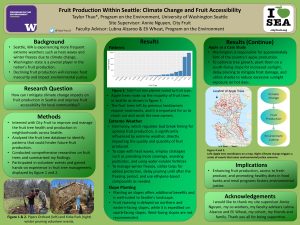FRUIT PRODUCTION WITHIN SEATTLE: CLIMATE CHANGE & ENVIRONMENTAL JUSTICE
Climate change is an ongoing crisis throughout the world, which could potentially impact millions of people and many ecosystem species. Seattle, Washington appears to have a decline in viable fruit production, mainly due to extreme weather. Extreme weather events such as Seattle freeze and heat waves impact the development of fruit trees which ultimately influences both the quality and quantity of fruits. The shortage of fruit could cause further food insecurity thus intersecting with the environmental justice issue. City Fruit is committed to assisting local orchards in growing feasible fruits as well as preserving fruit trees. The aim of this study is to address climate change and promote environmental justice in the lenses of fruit production. Interning at City Fruit granted me valuable insights on tree management through volunteering events and hands-on workshops. I was also able to explore the organization’s database to examine statistics about various fruit tree productions. Along with my independent research reports, I discovered ways to mitigate impacts on fruit trees from extreme weather events and Seattle’s urban environmental factors. These findings are important, because climate change is an ongoing crisis that is both urgent and inevitable. The crisis is not only a sophisticated and complex issue, but also a multifaceted issue caused by human attitude and behavior towards nature. The most effective approach to combating this issue is to better understand its impacts and maximize the reduction of those impacts.
